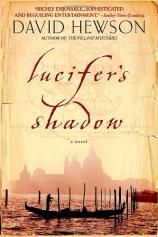Lucifer's Shadow
Review
Lucifer's Shadow
It was but a few short months ago that David Hewson was
reintroduced to American readers with A SEASON FOR THE DEAD, the
first of a projected series of novels featuring Italian State
Police detective Nic Costa. The second novel in the series, THE
VILLA OF MYSTERIES, has already seen European publication and is
scheduled for American release next year. Hewson has a bit of a
backlist that has not seen publication here. The issuance of
LUCIFER'S SHADOW only a few months after A SEASON FOR THE DEAD is a
welcome and important step toward remedying that literary
shortfall, while constituting a blessing for readers who, with one
novel, had become enthralled with Hewson's intricate plotting, and
intelligent and literary narration.
LUCIFER'S SHADOW consists of two stories, both of which are set in
Venice but separated in time by almost three centuries. The events
of the past dovetail into those of the present, with parallels that
surprise, astound, shock and delight. A printer's apprentice in
18th-century Venice is drawn into a web of duplicity, jealousy and
murder that centers on a brilliant orchestral work created by an
anonymous composer, who is in fact a Jewess. Her nationality and
gender compel her to keep her background and identity a secret, but
also leave her vulnerable to blackmail.
In present-day Venice, meanwhile, an English student named Daniel
Forster has accepted a summer job that ostensibly involves
cataloguing a private collector's library. Forster soon discovers,
however, that his job and his employer are not what they initially
seemed to be. Forster is in fact to be the go-between for his
employer with a petty thief who has acquired an antique violin, a
prize that is also sought by the shadowy Hugo Massiter, a wealthy
and ruthless figure whose life is shrouded in fear and rumor.
Forster's retrieval of the violin serves as the catalyst for a
star-crossed romance with Laura, the household's servant, whose
haunting beauty slowly and inexorably brings Forster under her
hesitant sway. The acquisition of the violin, and the discovery of
an abandoned musical manuscript, also provides the catalyst for a
succession of violent acts that lead all concerned toward certain
destruction.
The two tales alternate chapters, for the most part, with Hewson
keeping things moving at a deceptively sedate pace. He is no
particular hurry to reach either denouement, yet everything is set
forth with purpose. Hewson's research for this book is magnificent,
as it was for A SEASON FOR THE DEAD. The reader is transported
across space and time in this work, which demonstrates that the
elements, good and bad, that make up the human condition remain
constant, even with the tolling of the centuries. The parallels
between both of the stories in LUCIFER'S SHADOW is presented
subtlety, and when they converge for a brief moment, it is all the
more startling for the presentation.
Delacorte Press has somewhat defied conventional wisdom by
publishing two works by a new (to these shores) author within a few
months of each other. This was no doubt done with the knowledge
that anyone who had read A SEASON FOR THE DEAD would welcome more
Hewson, and welcome it immediately. For myself, it would be fine if
every month brought the arrival of a new Hewson novel. There is no
one who is doing this type of work --- work that by turns has
echoes of Christie, Dickens, O. Henry and even Poe on each page,
and yet is unshakably contemporary and unmistakably Hewson.
LUCIFER'S SHADOW, set in different time periods, is itself a
timeless work, a classic. Highest possible recommendation.
Reviewed by Joe Hartlaub on January 7, 2011





